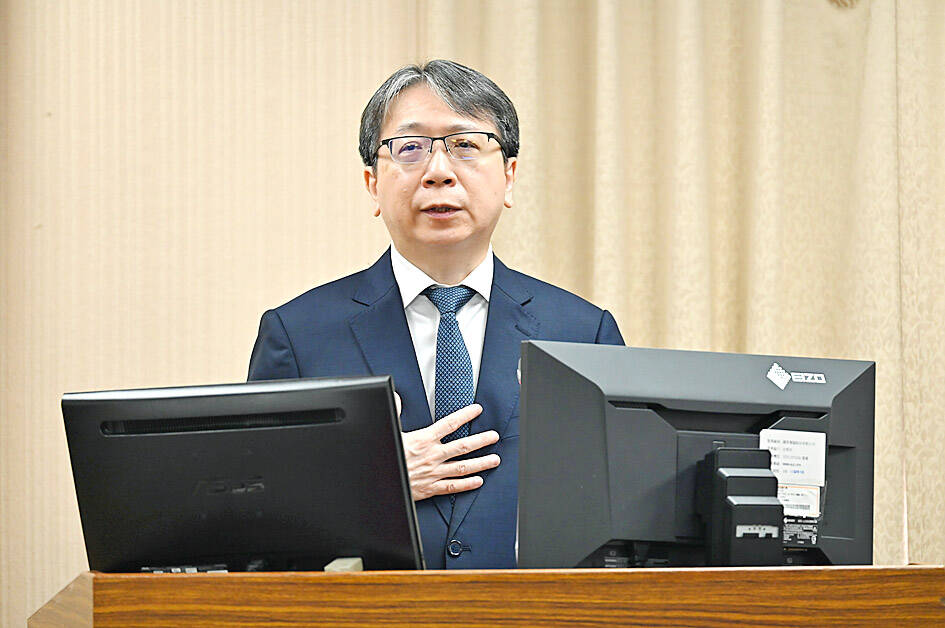Taiwan is monitoring China’s People’s Liberation Army (PLA) exercises for changes in their size or pattern as the nation prepares for president-elect William Lai’s (賴清德) inauguration on May 20, National Security Bureau (NSB) Director-General Tsai Ming-yen (蔡明彥) said yesterday.
Tsai made the comment at a meeting of the Legislative Yuan’s Foreign Affairs and National Defense Committee, in response to Democratic Progressive Party (DPP) Legislator Wang Ting-yu’s (王定宇) questions.
China continues to employ a carrot-and-stick approach, in which it applies pressure with “gray zone” tactics, while attempting to entice Taiwanese with perks, Tsai said.

Photo: Tu Chien-fa, Taipei Times
These actions aim to help Beijing look like it has the initiative in cross-strait affairs, he said.
The NSB will pay close attention to military drills Beijing might conduct and look for signs of change in the size and format of PLA exercises, he said.
An emerging trend for the PLA is to conduct nighttime joint combat readiness patrols with a more sophisticated mixture of aircraft and ships, he said.
It recently conducted three combat readiness patrols at night, in which landing ships, minesweepers and tanker aircraft were used, and performed aerial refueling to increase Chinese airplanes’ loiter time, Tsai said.
Taiwanese armed forces have adopted countermeasures against the observed changes in PLA activities, he said.
China stepped up gray zone incursions, dispatching government-operated ships to the waters near and around Taiwan, Tsai said, citing the incident in Kinmen in February that involved an unmarked Chinese speedboat.
The Chinese boat entered Taiwan’s restricted waters and capsized after colliding with a coast guard boat while fleeing, the Coast Guard Administration reported at the time.
Two of the boat’s four crew drowned. The Chinese sailors did not carry identity papers.
Tsai told a news conference held before the meeting that the PLA regularly schedules many large-scale drills from July to November.
Asked about Chinese People’s Political Consultative Conference Chairman Wang Huning’s (王滬寧) remarks denying the existence of a timetable for invading Taiwan, Tsai said maintaining peace and stability in the Strait is the nation’s most important strategic aim.
Maintaining peace is in the national interest of both sides across the Strait, and Taiwan hopes it can work with China to promote goodwill and reduce the risks of an incident spiraling out of control, he said.

AIR SUPPORT: The Ministry of National Defense thanked the US for the delivery, adding that it was an indicator of the White House’s commitment to the Taiwan Relations Act Deputy Minister of National Defense Po Horng-huei (柏鴻輝) and Representative to the US Alexander Yui on Friday attended a delivery ceremony for the first of Taiwan’s long-awaited 66 F-16C/D Block 70 jets at a Lockheed Martin Corp factory in Greenville, South Carolina. “We are so proud to be the global home of the F-16 and to support Taiwan’s air defense capabilities,” US Representative William Timmons wrote on X, alongside a photograph of Taiwanese and US officials at the event. The F-16C/D Block 70 jets Taiwan ordered have the same capabilities as aircraft that had been upgraded to F-16Vs. The batch of Lockheed Martin

GRIDLOCK: The National Fire Agency’s Special Search and Rescue team is on standby to travel to the countries to help out with the rescue effort A powerful earthquake rocked Myanmar and neighboring Thailand yesterday, killing at least three people in Bangkok and burying dozens when a high-rise building under construction collapsed. Footage shared on social media from Myanmar’s second-largest city showed widespread destruction, raising fears that many were trapped under the rubble or killed. The magnitude 7.7 earthquake, with an epicenter near Mandalay in Myanmar, struck at midday and was followed by a strong magnitude 6.4 aftershock. The extent of death, injury and destruction — especially in Myanmar, which is embroiled in a civil war and where information is tightly controlled at the best of times —

Taiwan was ranked the fourth-safest country in the world with a score of 82.9, trailing only Andorra, the United Arab Emirates and Qatar in Numbeo’s Safety Index by Country report. Taiwan’s score improved by 0.1 points compared with last year’s mid-year report, which had Taiwan fourth with a score of 82.8. However, both scores were lower than in last year’s first review, when Taiwan scored 83.3, and are a long way from when Taiwan was named the second-safest country in the world in 2021, scoring 84.8. Taiwan ranked higher than Singapore in ninth with a score of 77.4 and Japan in 10th with

China's military today said it began joint army, navy and rocket force exercises around Taiwan to "serve as a stern warning and powerful deterrent against Taiwanese independence," calling President William Lai (賴清德) a "parasite." The exercises come after Lai called Beijing a "foreign hostile force" last month. More than 10 Chinese military ships approached close to Taiwan's 24 nautical mile (44.4km) contiguous zone this morning and Taiwan sent its own warships to respond, two senior Taiwanese officials said. Taiwan has not yet detected any live fire by the Chinese military so far, one of the officials said. The drills took place after US Secretary